Counselling Session on Loss and Working with Loss
VerifiedAdded on 2023/01/19
|8
|2156
|21
AI Summary
This document provides an overview of a counselling session focused on loss and working with loss. It discusses the quality of the therapeutic alliance, key loss issues raised in the session, evaluation of counselling skills applied, interventions used, demonstration of therapeutic strengths, areas of improvement, effectiveness of the session, suggestions for improvement in the application of skills, and identification of other strategies or skills to assist the client. The document also includes references for further reading.
Contribute Materials
Your contribution can guide someone’s learning journey. Share your
documents today.
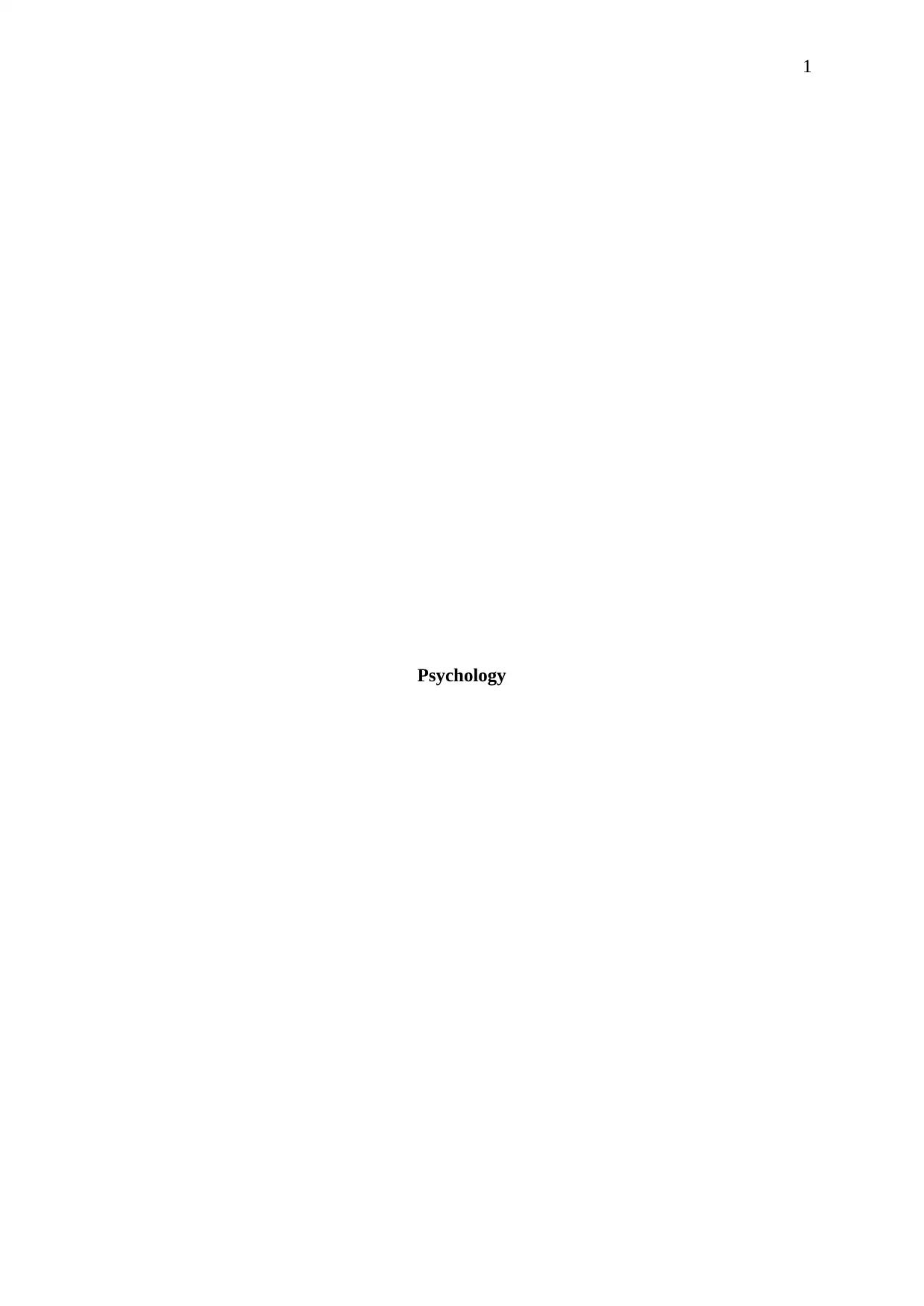
1
Psychology
Psychology
Secure Best Marks with AI Grader
Need help grading? Try our AI Grader for instant feedback on your assignments.
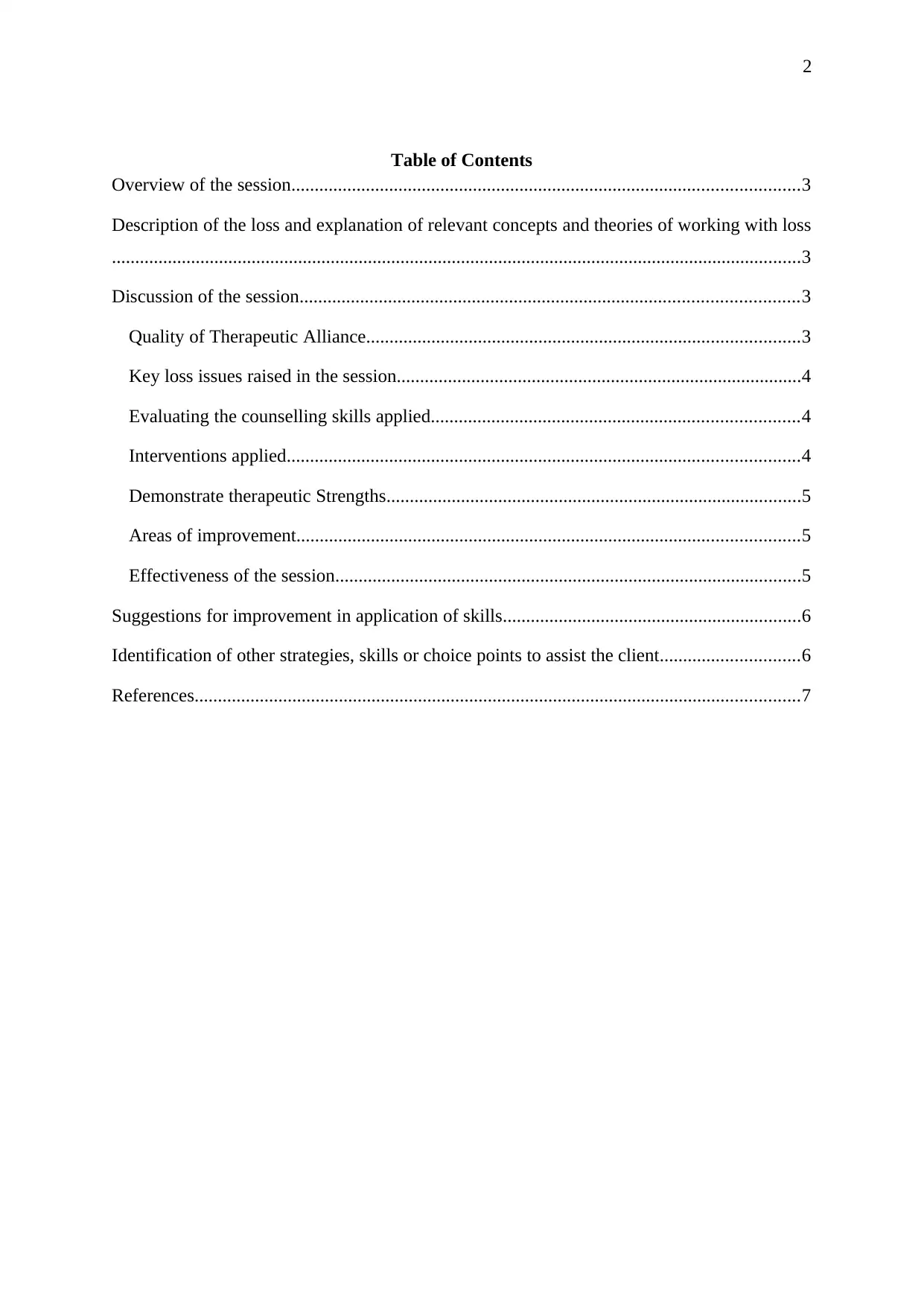
2
Table of Contents
Overview of the session.............................................................................................................3
Description of the loss and explanation of relevant concepts and theories of working with loss
....................................................................................................................................................3
Discussion of the session...........................................................................................................3
Quality of Therapeutic Alliance.............................................................................................3
Key loss issues raised in the session.......................................................................................4
Evaluating the counselling skills applied...............................................................................4
Interventions applied..............................................................................................................4
Demonstrate therapeutic Strengths.........................................................................................5
Areas of improvement............................................................................................................5
Effectiveness of the session....................................................................................................5
Suggestions for improvement in application of skills................................................................6
Identification of other strategies, skills or choice points to assist the client..............................6
References..................................................................................................................................7
Table of Contents
Overview of the session.............................................................................................................3
Description of the loss and explanation of relevant concepts and theories of working with loss
....................................................................................................................................................3
Discussion of the session...........................................................................................................3
Quality of Therapeutic Alliance.............................................................................................3
Key loss issues raised in the session.......................................................................................4
Evaluating the counselling skills applied...............................................................................4
Interventions applied..............................................................................................................4
Demonstrate therapeutic Strengths.........................................................................................5
Areas of improvement............................................................................................................5
Effectiveness of the session....................................................................................................5
Suggestions for improvement in application of skills................................................................6
Identification of other strategies, skills or choice points to assist the client..............................6
References..................................................................................................................................7
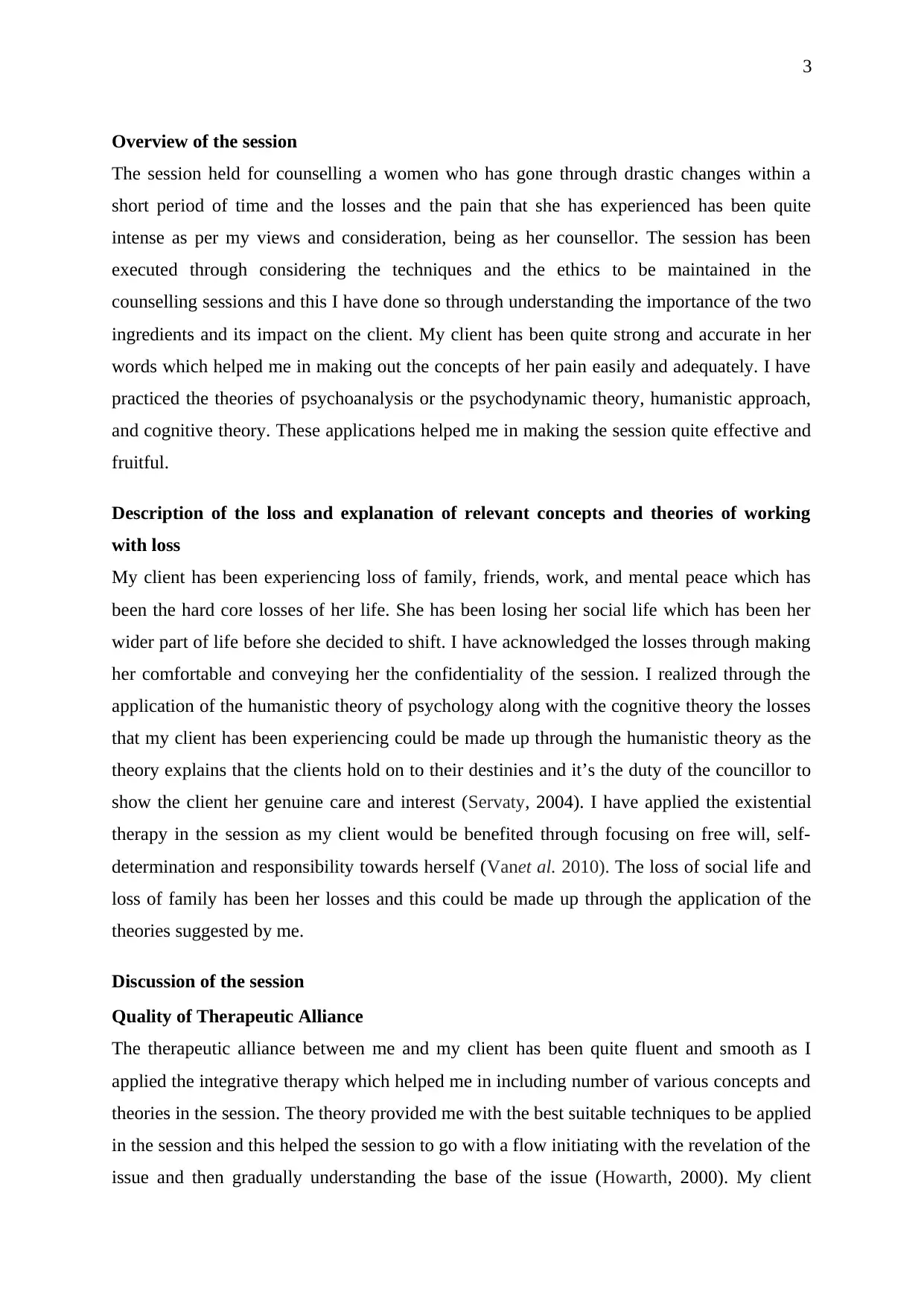
3
Overview of the session
The session held for counselling a women who has gone through drastic changes within a
short period of time and the losses and the pain that she has experienced has been quite
intense as per my views and consideration, being as her counsellor. The session has been
executed through considering the techniques and the ethics to be maintained in the
counselling sessions and this I have done so through understanding the importance of the two
ingredients and its impact on the client. My client has been quite strong and accurate in her
words which helped me in making out the concepts of her pain easily and adequately. I have
practiced the theories of psychoanalysis or the psychodynamic theory, humanistic approach,
and cognitive theory. These applications helped me in making the session quite effective and
fruitful.
Description of the loss and explanation of relevant concepts and theories of working
with loss
My client has been experiencing loss of family, friends, work, and mental peace which has
been the hard core losses of her life. She has been losing her social life which has been her
wider part of life before she decided to shift. I have acknowledged the losses through making
her comfortable and conveying her the confidentiality of the session. I realized through the
application of the humanistic theory of psychology along with the cognitive theory the losses
that my client has been experiencing could be made up through the humanistic theory as the
theory explains that the clients hold on to their destinies and it’s the duty of the councillor to
show the client her genuine care and interest (Servaty, 2004). I have applied the existential
therapy in the session as my client would be benefited through focusing on free will, self-
determination and responsibility towards herself (Vanet al. 2010). The loss of social life and
loss of family has been her losses and this could be made up through the application of the
theories suggested by me.
Discussion of the session
Quality of Therapeutic Alliance
The therapeutic alliance between me and my client has been quite fluent and smooth as I
applied the integrative therapy which helped me in including number of various concepts and
theories in the session. The theory provided me with the best suitable techniques to be applied
in the session and this helped the session to go with a flow initiating with the revelation of the
issue and then gradually understanding the base of the issue (Howarth, 2000). My client
Overview of the session
The session held for counselling a women who has gone through drastic changes within a
short period of time and the losses and the pain that she has experienced has been quite
intense as per my views and consideration, being as her counsellor. The session has been
executed through considering the techniques and the ethics to be maintained in the
counselling sessions and this I have done so through understanding the importance of the two
ingredients and its impact on the client. My client has been quite strong and accurate in her
words which helped me in making out the concepts of her pain easily and adequately. I have
practiced the theories of psychoanalysis or the psychodynamic theory, humanistic approach,
and cognitive theory. These applications helped me in making the session quite effective and
fruitful.
Description of the loss and explanation of relevant concepts and theories of working
with loss
My client has been experiencing loss of family, friends, work, and mental peace which has
been the hard core losses of her life. She has been losing her social life which has been her
wider part of life before she decided to shift. I have acknowledged the losses through making
her comfortable and conveying her the confidentiality of the session. I realized through the
application of the humanistic theory of psychology along with the cognitive theory the losses
that my client has been experiencing could be made up through the humanistic theory as the
theory explains that the clients hold on to their destinies and it’s the duty of the councillor to
show the client her genuine care and interest (Servaty, 2004). I have applied the existential
therapy in the session as my client would be benefited through focusing on free will, self-
determination and responsibility towards herself (Vanet al. 2010). The loss of social life and
loss of family has been her losses and this could be made up through the application of the
theories suggested by me.
Discussion of the session
Quality of Therapeutic Alliance
The therapeutic alliance between me and my client has been quite fluent and smooth as I
applied the integrative therapy which helped me in including number of various concepts and
theories in the session. The theory provided me with the best suitable techniques to be applied
in the session and this helped the session to go with a flow initiating with the revelation of the
issue and then gradually understanding the base of the issue (Howarth, 2000). My client
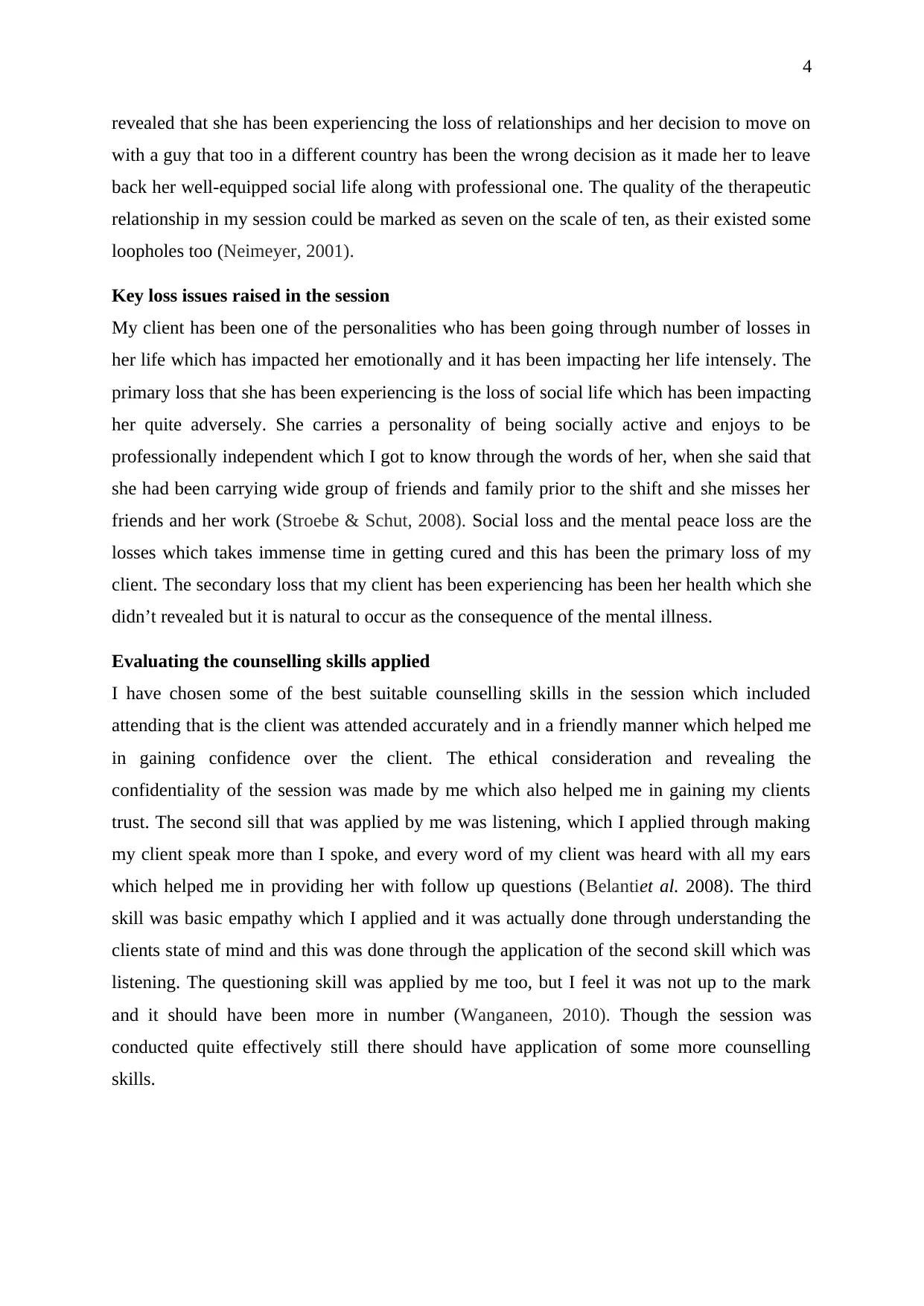
4
revealed that she has been experiencing the loss of relationships and her decision to move on
with a guy that too in a different country has been the wrong decision as it made her to leave
back her well-equipped social life along with professional one. The quality of the therapeutic
relationship in my session could be marked as seven on the scale of ten, as their existed some
loopholes too (Neimeyer, 2001).
Key loss issues raised in the session
My client has been one of the personalities who has been going through number of losses in
her life which has impacted her emotionally and it has been impacting her life intensely. The
primary loss that she has been experiencing is the loss of social life which has been impacting
her quite adversely. She carries a personality of being socially active and enjoys to be
professionally independent which I got to know through the words of her, when she said that
she had been carrying wide group of friends and family prior to the shift and she misses her
friends and her work (Stroebe & Schut, 2008). Social loss and the mental peace loss are the
losses which takes immense time in getting cured and this has been the primary loss of my
client. The secondary loss that my client has been experiencing has been her health which she
didn’t revealed but it is natural to occur as the consequence of the mental illness.
Evaluating the counselling skills applied
I have chosen some of the best suitable counselling skills in the session which included
attending that is the client was attended accurately and in a friendly manner which helped me
in gaining confidence over the client. The ethical consideration and revealing the
confidentiality of the session was made by me which also helped me in gaining my clients
trust. The second sill that was applied by me was listening, which I applied through making
my client speak more than I spoke, and every word of my client was heard with all my ears
which helped me in providing her with follow up questions (Belantiet al. 2008). The third
skill was basic empathy which I applied and it was actually done through understanding the
clients state of mind and this was done through the application of the second skill which was
listening. The questioning skill was applied by me too, but I feel it was not up to the mark
and it should have been more in number (Wanganeen, 2010). Though the session was
conducted quite effectively still there should have application of some more counselling
skills.
revealed that she has been experiencing the loss of relationships and her decision to move on
with a guy that too in a different country has been the wrong decision as it made her to leave
back her well-equipped social life along with professional one. The quality of the therapeutic
relationship in my session could be marked as seven on the scale of ten, as their existed some
loopholes too (Neimeyer, 2001).
Key loss issues raised in the session
My client has been one of the personalities who has been going through number of losses in
her life which has impacted her emotionally and it has been impacting her life intensely. The
primary loss that she has been experiencing is the loss of social life which has been impacting
her quite adversely. She carries a personality of being socially active and enjoys to be
professionally independent which I got to know through the words of her, when she said that
she had been carrying wide group of friends and family prior to the shift and she misses her
friends and her work (Stroebe & Schut, 2008). Social loss and the mental peace loss are the
losses which takes immense time in getting cured and this has been the primary loss of my
client. The secondary loss that my client has been experiencing has been her health which she
didn’t revealed but it is natural to occur as the consequence of the mental illness.
Evaluating the counselling skills applied
I have chosen some of the best suitable counselling skills in the session which included
attending that is the client was attended accurately and in a friendly manner which helped me
in gaining confidence over the client. The ethical consideration and revealing the
confidentiality of the session was made by me which also helped me in gaining my clients
trust. The second sill that was applied by me was listening, which I applied through making
my client speak more than I spoke, and every word of my client was heard with all my ears
which helped me in providing her with follow up questions (Belantiet al. 2008). The third
skill was basic empathy which I applied and it was actually done through understanding the
clients state of mind and this was done through the application of the second skill which was
listening. The questioning skill was applied by me too, but I feel it was not up to the mark
and it should have been more in number (Wanganeen, 2010). Though the session was
conducted quite effectively still there should have application of some more counselling
skills.
Secure Best Marks with AI Grader
Need help grading? Try our AI Grader for instant feedback on your assignments.
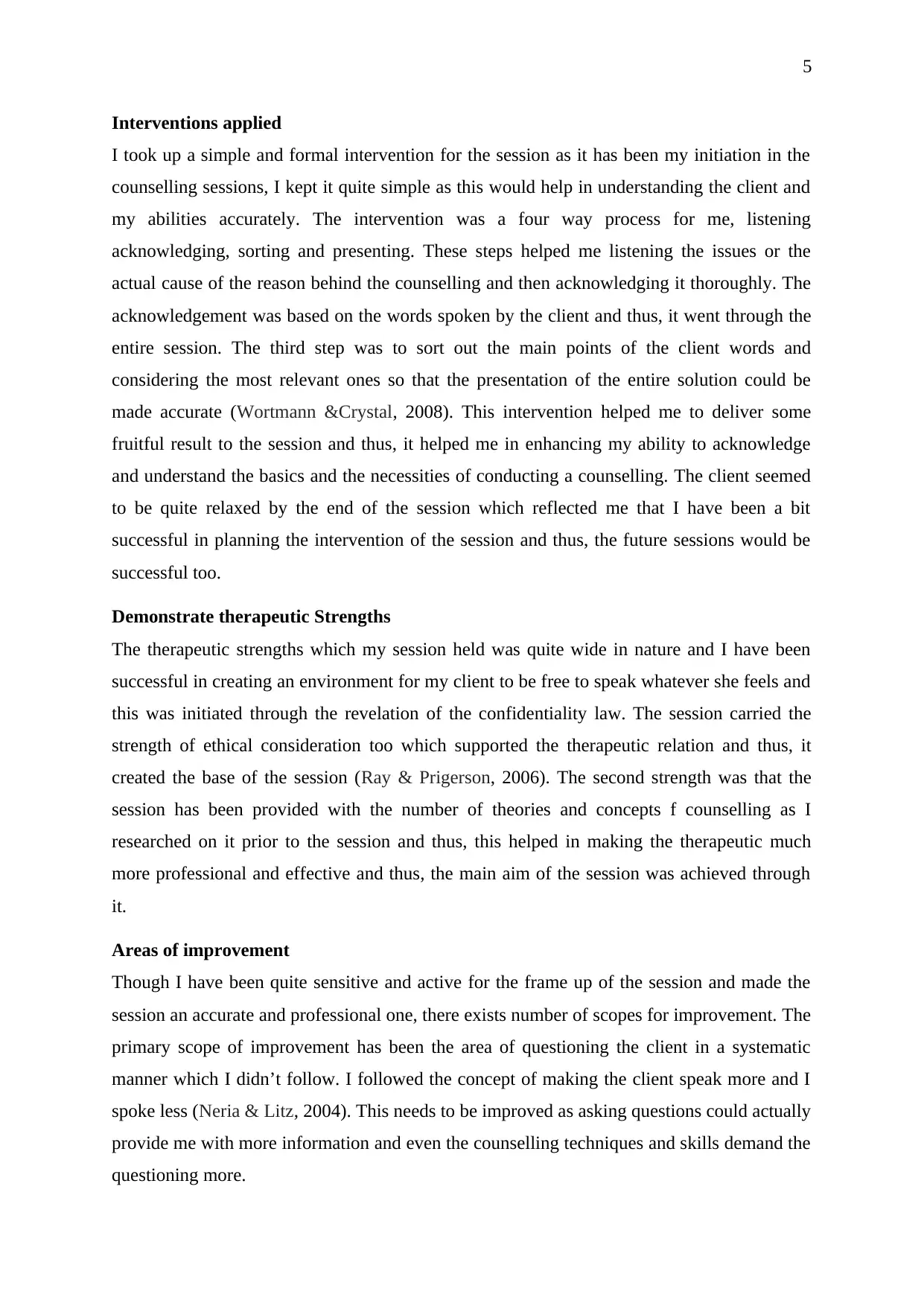
5
Interventions applied
I took up a simple and formal intervention for the session as it has been my initiation in the
counselling sessions, I kept it quite simple as this would help in understanding the client and
my abilities accurately. The intervention was a four way process for me, listening
acknowledging, sorting and presenting. These steps helped me listening the issues or the
actual cause of the reason behind the counselling and then acknowledging it thoroughly. The
acknowledgement was based on the words spoken by the client and thus, it went through the
entire session. The third step was to sort out the main points of the client words and
considering the most relevant ones so that the presentation of the entire solution could be
made accurate (Wortmann &Crystal, 2008). This intervention helped me to deliver some
fruitful result to the session and thus, it helped me in enhancing my ability to acknowledge
and understand the basics and the necessities of conducting a counselling. The client seemed
to be quite relaxed by the end of the session which reflected me that I have been a bit
successful in planning the intervention of the session and thus, the future sessions would be
successful too.
Demonstrate therapeutic Strengths
The therapeutic strengths which my session held was quite wide in nature and I have been
successful in creating an environment for my client to be free to speak whatever she feels and
this was initiated through the revelation of the confidentiality law. The session carried the
strength of ethical consideration too which supported the therapeutic relation and thus, it
created the base of the session (Ray & Prigerson, 2006). The second strength was that the
session has been provided with the number of theories and concepts f counselling as I
researched on it prior to the session and thus, this helped in making the therapeutic much
more professional and effective and thus, the main aim of the session was achieved through
it.
Areas of improvement
Though I have been quite sensitive and active for the frame up of the session and made the
session an accurate and professional one, there exists number of scopes for improvement. The
primary scope of improvement has been the area of questioning the client in a systematic
manner which I didn’t follow. I followed the concept of making the client speak more and I
spoke less (Neria & Litz, 2004). This needs to be improved as asking questions could actually
provide me with more information and even the counselling techniques and skills demand the
questioning more.
Interventions applied
I took up a simple and formal intervention for the session as it has been my initiation in the
counselling sessions, I kept it quite simple as this would help in understanding the client and
my abilities accurately. The intervention was a four way process for me, listening
acknowledging, sorting and presenting. These steps helped me listening the issues or the
actual cause of the reason behind the counselling and then acknowledging it thoroughly. The
acknowledgement was based on the words spoken by the client and thus, it went through the
entire session. The third step was to sort out the main points of the client words and
considering the most relevant ones so that the presentation of the entire solution could be
made accurate (Wortmann &Crystal, 2008). This intervention helped me to deliver some
fruitful result to the session and thus, it helped me in enhancing my ability to acknowledge
and understand the basics and the necessities of conducting a counselling. The client seemed
to be quite relaxed by the end of the session which reflected me that I have been a bit
successful in planning the intervention of the session and thus, the future sessions would be
successful too.
Demonstrate therapeutic Strengths
The therapeutic strengths which my session held was quite wide in nature and I have been
successful in creating an environment for my client to be free to speak whatever she feels and
this was initiated through the revelation of the confidentiality law. The session carried the
strength of ethical consideration too which supported the therapeutic relation and thus, it
created the base of the session (Ray & Prigerson, 2006). The second strength was that the
session has been provided with the number of theories and concepts f counselling as I
researched on it prior to the session and thus, this helped in making the therapeutic much
more professional and effective and thus, the main aim of the session was achieved through
it.
Areas of improvement
Though I have been quite sensitive and active for the frame up of the session and made the
session an accurate and professional one, there exists number of scopes for improvement. The
primary scope of improvement has been the area of questioning the client in a systematic
manner which I didn’t follow. I followed the concept of making the client speak more and I
spoke less (Neria & Litz, 2004). This needs to be improved as asking questions could actually
provide me with more information and even the counselling techniques and skills demand the
questioning more.
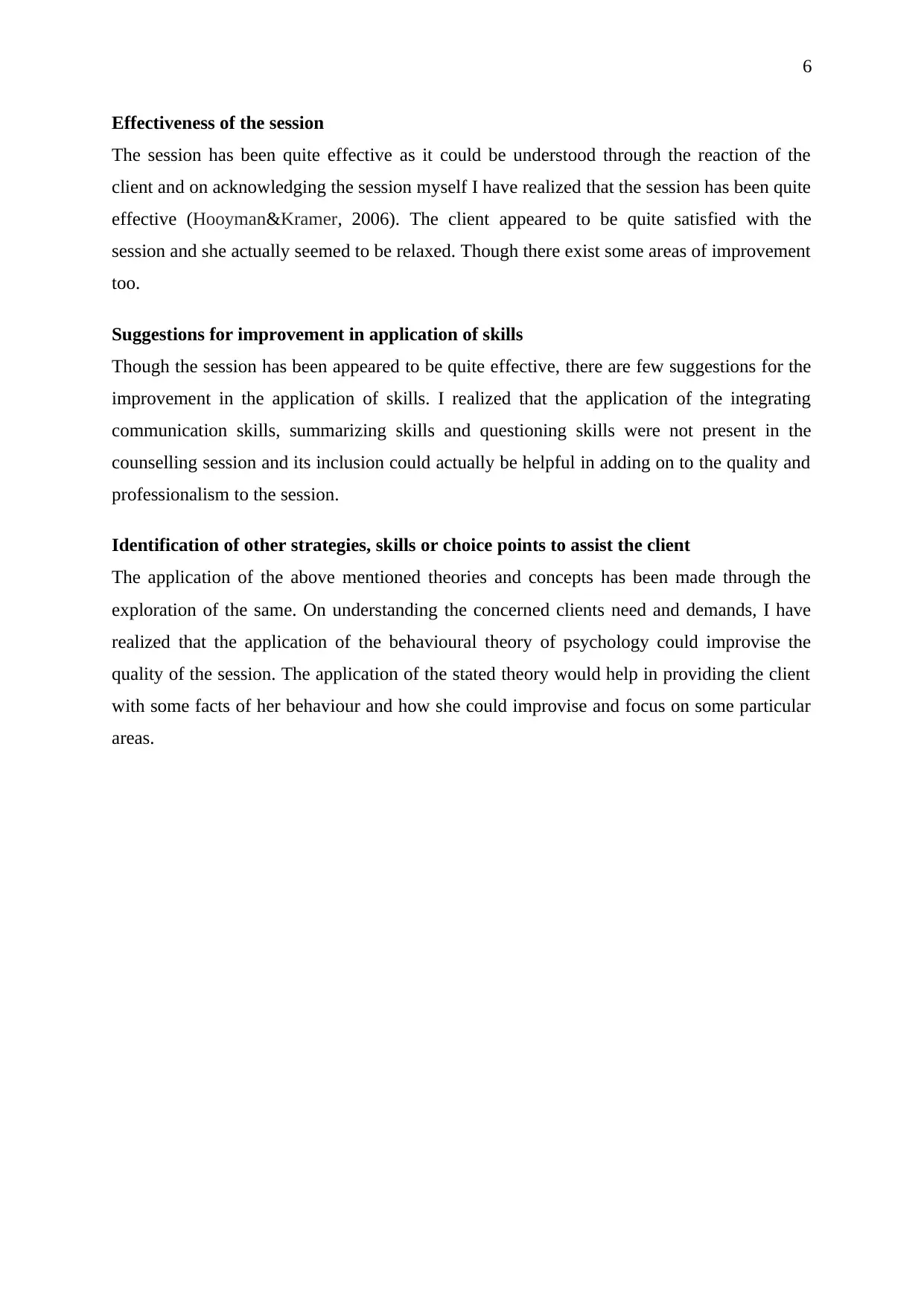
6
Effectiveness of the session
The session has been quite effective as it could be understood through the reaction of the
client and on acknowledging the session myself I have realized that the session has been quite
effective (Hooyman&Kramer, 2006). The client appeared to be quite satisfied with the
session and she actually seemed to be relaxed. Though there exist some areas of improvement
too.
Suggestions for improvement in application of skills
Though the session has been appeared to be quite effective, there are few suggestions for the
improvement in the application of skills. I realized that the application of the integrating
communication skills, summarizing skills and questioning skills were not present in the
counselling session and its inclusion could actually be helpful in adding on to the quality and
professionalism to the session.
Identification of other strategies, skills or choice points to assist the client
The application of the above mentioned theories and concepts has been made through the
exploration of the same. On understanding the concerned clients need and demands, I have
realized that the application of the behavioural theory of psychology could improvise the
quality of the session. The application of the stated theory would help in providing the client
with some facts of her behaviour and how she could improvise and focus on some particular
areas.
Effectiveness of the session
The session has been quite effective as it could be understood through the reaction of the
client and on acknowledging the session myself I have realized that the session has been quite
effective (Hooyman&Kramer, 2006). The client appeared to be quite satisfied with the
session and she actually seemed to be relaxed. Though there exist some areas of improvement
too.
Suggestions for improvement in application of skills
Though the session has been appeared to be quite effective, there are few suggestions for the
improvement in the application of skills. I realized that the application of the integrating
communication skills, summarizing skills and questioning skills were not present in the
counselling session and its inclusion could actually be helpful in adding on to the quality and
professionalism to the session.
Identification of other strategies, skills or choice points to assist the client
The application of the above mentioned theories and concepts has been made through the
exploration of the same. On understanding the concerned clients need and demands, I have
realized that the application of the behavioural theory of psychology could improvise the
quality of the session. The application of the stated theory would help in providing the client
with some facts of her behaviour and how she could improvise and focus on some particular
areas.
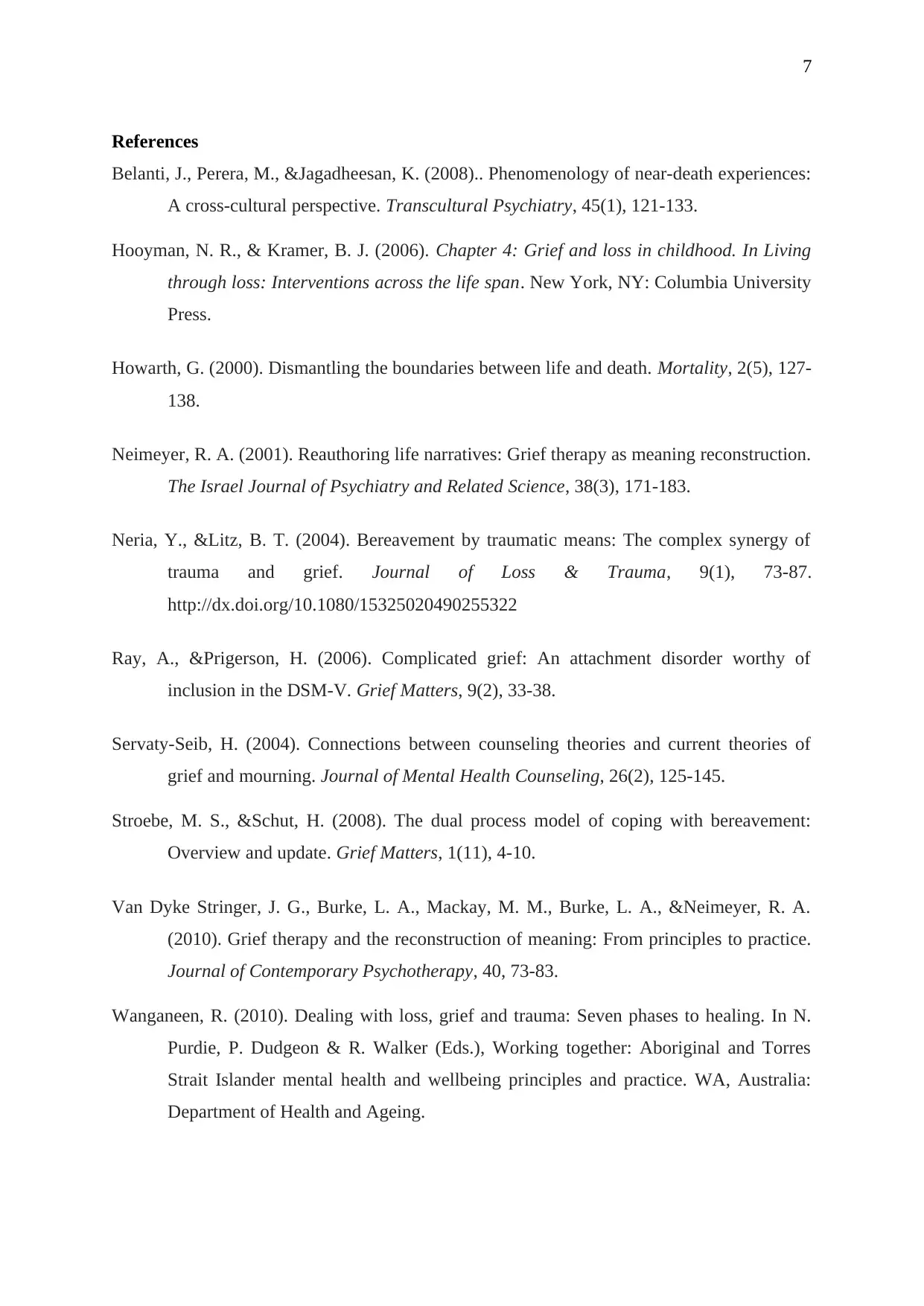
7
References
Belanti, J., Perera, M., &Jagadheesan, K. (2008).. Phenomenology of near-death experiences:
A cross-cultural perspective. Transcultural Psychiatry, 45(1), 121-133.
Hooyman, N. R., & Kramer, B. J. (2006). Chapter 4: Grief and loss in childhood. In Living
through loss: Interventions across the life span. New York, NY: Columbia University
Press.
Howarth, G. (2000). Dismantling the boundaries between life and death. Mortality, 2(5), 127-
138.
Neimeyer, R. A. (2001). Reauthoring life narratives: Grief therapy as meaning reconstruction.
The Israel Journal of Psychiatry and Related Science, 38(3), 171-183.
Neria, Y., &Litz, B. T. (2004). Bereavement by traumatic means: The complex synergy of
trauma and grief. Journal of Loss & Trauma, 9(1), 73-87.
http://dx.doi.org/10.1080/15325020490255322
Ray, A., &Prigerson, H. (2006). Complicated grief: An attachment disorder worthy of
inclusion in the DSM-V. Grief Matters, 9(2), 33-38.
Servaty-Seib, H. (2004). Connections between counseling theories and current theories of
grief and mourning. Journal of Mental Health Counseling, 26(2), 125-145.
Stroebe, M. S., &Schut, H. (2008). The dual process model of coping with bereavement:
Overview and update. Grief Matters, 1(11), 4-10.
Van Dyke Stringer, J. G., Burke, L. A., Mackay, M. M., Burke, L. A., &Neimeyer, R. A.
(2010). Grief therapy and the reconstruction of meaning: From principles to practice.
Journal of Contemporary Psychotherapy, 40, 73-83.
Wanganeen, R. (2010). Dealing with loss, grief and trauma: Seven phases to healing. In N.
Purdie, P. Dudgeon & R. Walker (Eds.), Working together: Aboriginal and Torres
Strait Islander mental health and wellbeing principles and practice. WA, Australia:
Department of Health and Ageing.
References
Belanti, J., Perera, M., &Jagadheesan, K. (2008).. Phenomenology of near-death experiences:
A cross-cultural perspective. Transcultural Psychiatry, 45(1), 121-133.
Hooyman, N. R., & Kramer, B. J. (2006). Chapter 4: Grief and loss in childhood. In Living
through loss: Interventions across the life span. New York, NY: Columbia University
Press.
Howarth, G. (2000). Dismantling the boundaries between life and death. Mortality, 2(5), 127-
138.
Neimeyer, R. A. (2001). Reauthoring life narratives: Grief therapy as meaning reconstruction.
The Israel Journal of Psychiatry and Related Science, 38(3), 171-183.
Neria, Y., &Litz, B. T. (2004). Bereavement by traumatic means: The complex synergy of
trauma and grief. Journal of Loss & Trauma, 9(1), 73-87.
http://dx.doi.org/10.1080/15325020490255322
Ray, A., &Prigerson, H. (2006). Complicated grief: An attachment disorder worthy of
inclusion in the DSM-V. Grief Matters, 9(2), 33-38.
Servaty-Seib, H. (2004). Connections between counseling theories and current theories of
grief and mourning. Journal of Mental Health Counseling, 26(2), 125-145.
Stroebe, M. S., &Schut, H. (2008). The dual process model of coping with bereavement:
Overview and update. Grief Matters, 1(11), 4-10.
Van Dyke Stringer, J. G., Burke, L. A., Mackay, M. M., Burke, L. A., &Neimeyer, R. A.
(2010). Grief therapy and the reconstruction of meaning: From principles to practice.
Journal of Contemporary Psychotherapy, 40, 73-83.
Wanganeen, R. (2010). Dealing with loss, grief and trauma: Seven phases to healing. In N.
Purdie, P. Dudgeon & R. Walker (Eds.), Working together: Aboriginal and Torres
Strait Islander mental health and wellbeing principles and practice. WA, Australia:
Department of Health and Ageing.
Paraphrase This Document
Need a fresh take? Get an instant paraphrase of this document with our AI Paraphraser

8
Wortmann, J. H., & Crystal, L. P. (2008). Religion and spirituality in adjustment following
bereavement: An integrative review. Death Studies, 32, 703-736. .
Wortmann, J. H., & Crystal, L. P. (2008). Religion and spirituality in adjustment following
bereavement: An integrative review. Death Studies, 32, 703-736. .
1 out of 8
Related Documents
Your All-in-One AI-Powered Toolkit for Academic Success.
+13062052269
info@desklib.com
Available 24*7 on WhatsApp / Email
![[object Object]](/_next/static/media/star-bottom.7253800d.svg)
Unlock your academic potential
© 2024 | Zucol Services PVT LTD | All rights reserved.





